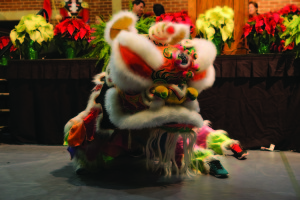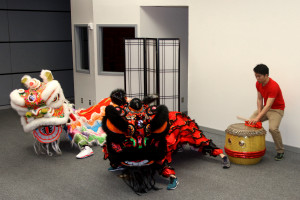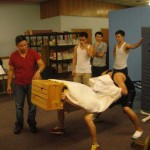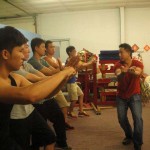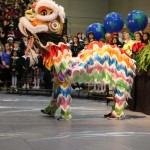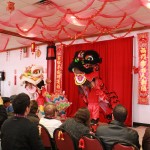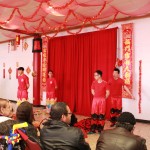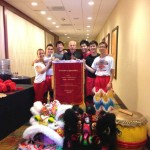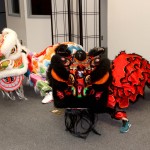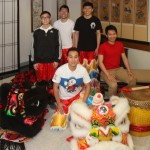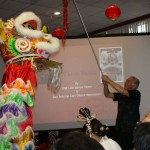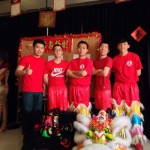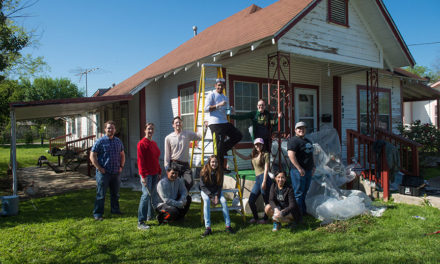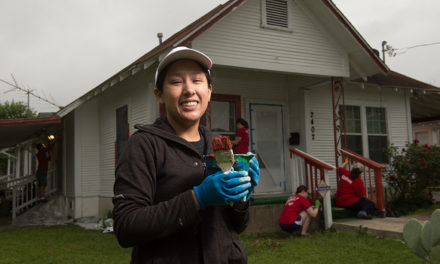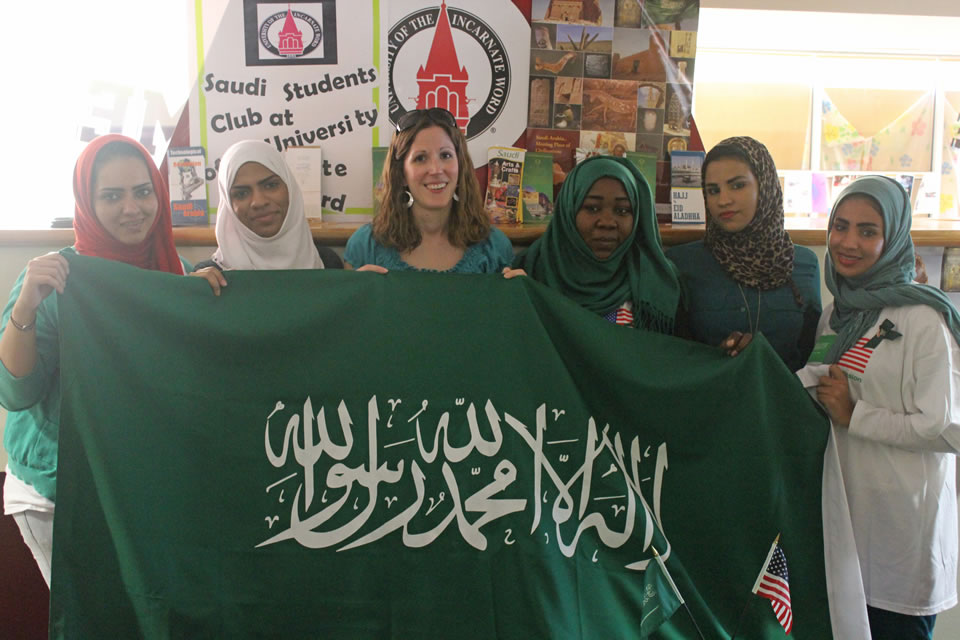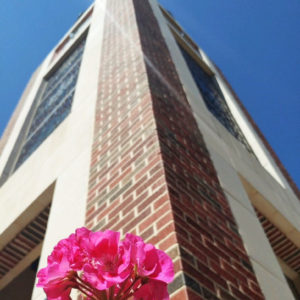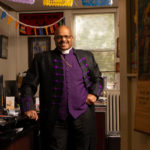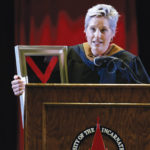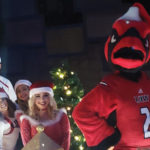
Pictured L-R: Qihao Feng (Anson); Jianhong Zhang (Kevin); Mingzhi Chen (Eddie); Misty Chen, director of the Institute of World Cultures; Ao Li (Leo); and Chenlian Li (Kyle).
By Brance Arnold ’10 MA
It is the Year of the Horse! Jianhong Zhang and Mingzhi Chen, also known as Kevin and Eddie, were filled with nervous energy and palpable excitement before performing the lion dance for the first time publicly at the Institute of World Cultures’ (IWC) Asian New Year celebration, held annually at UIW. The IWC Lion Dance Team’s newest members, Kevin and Eddie, along with their more experienced teammates, practiced fervently for two months in preparation for the most important celebration in Asian tradition.
In November, Kevin, a business administration graduate student, and Eddie, a marketing sophomore, joined seasoned teammates Ao Li (Leo), international business senior; Qihao Feng (Anson), philosophy senior; and Chenlian Li (Kyle), international business senior; to round out the team’s lineup.
Origins of Lion Dance at UIW
UIW’s Lion Dance Team was established by Misty Chen, director of the IWC, and Dr. Patricia Watkins, vice president emeritus and consultant to the president. Originally, Chen would invite the San Antonio Lion Dance Association (SALDA) to perform at the annual UIW Asian New Year celebration, presented by the IWC.
“When we would plan the Asian New Year celebration, we wanted to incorporate Asian activities and here in San Antonio there wasn’t a large Chinese community. So we asked them to come perform for us,” recalled Chen.
To best benefit students and faculty, the event had to be scheduled for a weekday. However, the members of the SALDA had professional obligations during the week and were unable to perform.
“We struggled. We reached out to Austin and Houston, but that was more complicated. It got to the point where we decided we should start our own team,” Chen said.
In 2007, Chen traveled to Guangzhou, China to purchase the lion costumes without yet having team members in place.
“I personally picked them out,” said Chen. “I chose red, white and black to represent the school colors and the other costume I wanted to have bright, festival colors.”
History and Performance
Alive and well at UIW, the colorful, vibrant tradition is deeply rooted in Asian culture with the art form recorded as early as the third century AD in China. Though the lion is not native to China and the dance may have originated in India or Persia, the lion was introduced via traders from the West who used the Silk Road to China for trade and brought lions as gifts during the Han Dynasty. Various forms of the lion dance are found throughout Asia, including Vietnam, Korea, Japan, Tibet, and Taiwan, among others.
Each lion costume is typically operated by two dancers. Performers mimic the movements of the lion to represent moods and emotions, usually those of an uplifting nature.
“With the control of body movements, you are expressing emotion,” said Chen. “Asian culture is very into the idea of luck. It’s all about happiness. It’s all about hope.”
Lion dance movements are fundamentally inspired by martial arts, particularly Kung Fu and Wushu. There are two primary forms of Chinese lion dance, the Northern Lion and the Southern Lion. The Northern is acrobatic and performed mainly as entertainment, where the Southern is ceremonial and symbiotic, summoning good fortune and luck while guarding against evil spirits.
The dance is also about connecting with family and community.
“It’s not only about celebrating the coming of the New Year but also about family. You can see at one point in the performance one lion crouches while the other performs. After the lion performs, he comes over to the sitting lion and the two communicate and then dance together,” explained Kevin.
UIW’s Lion Dance Team, which embodies more of the Southern form, performs as two lions, with Leo and Kyle performing in one costume, and Eddie and Kevin in another, accompanied by drummer Anson. The accents played on the drum and voice commands from the drummer guide the lions’ movements.
“The drummer is the key feel among the team,” said Chen, “like a team captain who directs the dancers through changes in tempo and intensity.”
“The two lions follow the beat of the drums during the performance which continues for about 10 minutes,” said Kevin. “We have one person who acts as the lion’s head and the other as the lion’s tail. The tail follows the head during the whole performance.”
The lion dance remains a staple at the Asian New Year celebration and continues to grow in popularity. During the performance, the main duty of the lion is to “catch the green” or “cai qing” which literally translates to “plucking the green.” This custom entails the “green” being tied together with a red envelope containing money or fruit and placed on a pole for the lion to catch, thus bringing good fortune.
The Team
Though the team currently numbers five, Kevin said it generally is made up of eight to 10 members, with five to perform and three to five serving as substitute members.
In order to prepare for the Asian New Year celebration, one of a number of events at which the team performs, the members train at the SALDA every Sunday for two hours under the guidance of one of the association’s members. Additionally, they train in the ICC Auditorium on their own. None of the team members had previous experience performing the lion dance before joining the team.
“We work hard and improve together through learning the lion dance,” said Kyle, a team member for two years. “Every member tries his best.”
Though the current roster is composed entirely of students from China, the team welcomes those of all cultures and has, in fact, had members from various backgrounds.
“Anyone can join,” added Chen. “We are hoping to spread the word and make the call to the community welcoming everyone whether girl or boy; domestic or international; faculty, students, or friends. Come experience the culture, learn an entry level of martial arts, make connections, and feel proud when you perform.”
Chen remains committed to preserving the Lion Dance Team at UIW for years to come, but confessed she will need to recruit new members to carry on the tradition.
“Kevin and Eddie plan to continue next year, but the other members are set to graduate and return to their home country. The reality is, students graduate,” Chen said.
Chen also stressed that support from the UIW community is integral to the preservation of the team. The team is not a university funded organization and team members are devoted to the practice of lion dance purely for love of the art form and to celebrate UIW as an international community.
Cultural Significance
At UIW, the team plays a key role in celebrating the Asian New Year and the wide range of cultures visible on campus.
“The lion dance represents not only a Chinese tradition and culture, but other Asian countries that also have the lion dance as part of their tradition and culture,” said Marcos Fragoso, vice president for international affairs. “At UIW we welcome diversity and want to celebrate it every time we can, one of the ways to do so is by allowing students from different countries to perform and dance according to their traditions.”
“The New Year celebration is one of the most important festivals in Asian countries where they celebrate the Lunar New Year,” said Chen. “Most of our Asian students would never be able to go home and be with their family for this most important time.” Chen said the IWC’s Asian New Year celebration including the lion dance bring a “home feel” to international students so far from their homeland.
A member of the team for two years, Anson said he feels more connected to his home and culture through the tradition: “Lion dance makes me feel I love my country and becomes a very important part of my spiritual practice.”
To learn more about the Lion Dance Team and how to participate, visit IWC on Facebook at www.facebook.com/uiw.iwc or by calling (210) 805-5820.
- UIW’s Lion Dance Team practice at the San Antonio Lion Dance Association (SALDA).
- Team members practice at SALDA.
- The team performs at the 2014 Light the Way.
- The team performs at the 2014 Asian New Year Celebration in Marian Hall Ballroom.
- The team prepares to perform at the Asian New Year Celebration.
- Lion Dance Team members share a photo with UIW President Dr. Louis Agnese.
- Team members practice in the ICC Auditorium.
- UIW’s 2014 Lion Dance Team
- Dr. Agnese particpates in the Lion Dance’s “catching the green” tradition at the Asian New Year Celebration.
- Team members pose during the Asian New Year Celebration.
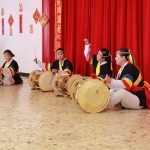 Read more about the 2014 Asian New Year Celebration at UIW.
Read more about the 2014 Asian New Year Celebration at UIW.

